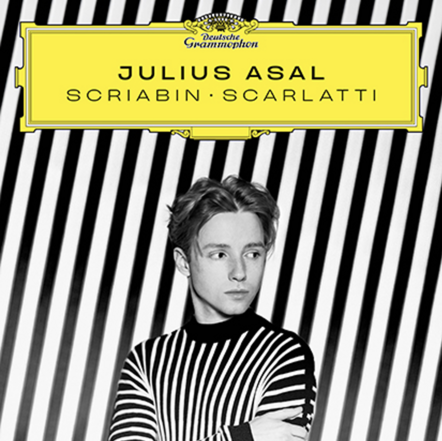New York, NY (Top40 Charts) Alexander Scriabin (1872-1915) and Domenico Scarlatti (1685-1757) prove to be engaging and complementary characters in the hands of German pianist Julius Asal, whose debut Deutsche Grammophon album is set for release in all formats on May 3, 2024. Scriabin - Scarlatti is built from works by two composers rarely mentioned in the same breath, the one a Russian absorbed by mysticism and its expression in the arts, the other a Neapolitan noted for the panache of his 555 keyboard sonatas. The album creates a dreamlike meditation in which the boundaries between pieces, eras and states of mind fade away. "Everything's possible in a dream", says the 27-year-old artist, who has a rare talent for innovative programme curation. "Even seemingly different materials from different times and with different densities can merge and create a new substance that's never existed before. That's how I felt while I was recording the music of Scriabin and Scarlatti."
Scriabin - Scarlatti interleaves Scriabin's Piano Sonata No. 1 in F minor, Op. 6, which Asal has loved since he was a small boy, a selection of early preludes and one of the Etudes, Op. 8 with six of Scarlatti's sonatas, the melancholy Sonata in F minor, K.466 and wistful Sonata in B flat major, K.544 among them. Explaining his choice of these more introspective works, Asal says they needed to fit in with his overall vision: "I wanted the whole album to be a deep psychological experience, which grows in unexpected directions and holds the listener with every step."
"It was difficult to pick from all the Scarlatti sonatas," he adds. "But there's a limit to what we could fit on the album and I wanted to include all the repeated sections and make sure they sounded different the second time round. You never say 'I love you' the same way twice!"
Asal uses the Quasi niente section from the final movement (Funèbre) of Scriabin's Sonata as a structural element in his programme. It both opens and closes the album, as well as appearing in its original context. "The idea of anticipating the Quasi niente emerged partly from the desire to create a déjà vu effect when it reappears in the sonata," he explains. As prologue, it resolves harmonically into Scarlatti's K.466; as epilogue, it completes the circle but takes on "a completely different significance".
He also created a pair of improvisatory Transitions specially for the recording, using them as linking components in an album that imagines his chosen composers as travellers through time past, present and future. "Perhaps people will sense the symmetry of the real and the imaginary - the original compositions and how they've been brought together with the programming and my two Transitions by an act of imagination."
Having used two different Steinway grand pianos for the album, Julius Asal also decided to record a selection of the Scriabin and Scarlatti pieces on an upright piano. The instrument, he recalls, "was from DDR times and not easy to control", but it allowed him to find a new perspective on the music and uncover unexpected facets in it.
Some of these recordings are among the tracks DG is releasing digitally ahead of the album. A double single featuring Scriabin's Prélude Op. 11 No. 20 and the upright version of Scarlatti's K.466 comes out on 16 February. The upright version of the album's Prologue (the Quasi niente from the Scriabin Sonata) will be issued on 1 March; Scriabin's Prélude in B major Op. 16 No. 1 (upright version) paired with Scarlatti's Sonata in B minor K.87 on 29 March; and Asal's Transition II coupled with Scriabin's Prélude in E flat minor Op. 11 No. 14 on 12 April.
"Julius Asal's piano playing immediately astonished me. I don't know how he found his uniquely sonorous sound. The instrument seemed to tell him a secret."
German pianist Julius Asal grew up as the eldest son in a family of musicians in the Taunus mountains near Frankfurt. His first encounters with the piano happened before he began to speak, and even as a toddler he improvised fluently and taught himself to play by ear. Only years later did he receive formal lessons, studying at the Hochschule für Musik "Hanns Eisler" Berlin and the Kronberg Academy. Today, a laureate of numerous competitions, Asal is a regular guest at international festivals and prestigious concert halls, performing at venues such as London's Wigmore Hall, the Vienna Musikverein, Laeiszhalle Hamburg and Suntory Hall in Tokyo. In recent years, his artistry has been significantly influenced by his mentors Eldar Nebolsin and Sir András Schiff, and he has also drawn inspiration from such musicians as Alfred Brendel, Gidon Kremer and Menahem Pressler.
In spring 2022, Julius Asal's debut album, featuring works by Prokofiev and the pianist's own arrangements from the ballet
Romeo and Juliet, was released to international acclaim by the Spanish label IBS Classical. In 2023, Asal signed an exclusive contract with Deutsche Grammophon.
His gift for improvisation, based on the fact that the language of the piano was the first he learned to speak, remains with him to this day, sometimes surfacing in his live performances. In October 2023, for example, he stepped in at a few hours' notice to appear at a DG Yellow Lounge event, presenting an innovative set that wove together classical pieces and improvisations. After his French debut, in Toulouse, Le Monde hailed the "captivating strangeness" of his playing and programme selection in a review headed "The hidden and beautiful alliances of Julius Asal."
























